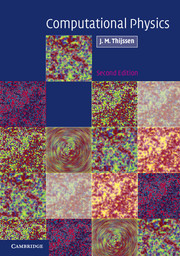Book contents
- Frontmatter
- Contents
- Preface to the first edition
- Preface to the second edition
- 1 Introduction
- 2 Quantum scattering with a spherically symmetric potential
- 3 The variational method for the Schrödinger equation
- 4 The Hartree–Fock method
- 5 Density functional theory
- 6 Solving the Schrödinger equation in periodic solids
- 7 Classical equilibrium statistical mechanics
- 8 Molecular dynamics simulations
- 9 Quantum molecular dynamics
- 10 The Monte Carlo method
- 11 Transfer matrix and diagonalisation of spin chains
- 12 Quantum Monte Carlo methods
- 13 The finite element method for partial differential equations
- 14 The lattice Boltzmann method for fluid dynamics
- 15 Computational methods for lattice field theories
- 16 High performance computing and parallelism
- Appendix A Numerical methods
- Appendix B Random number generators
- Index
5 - Density functional theory
Published online by Cambridge University Press: 05 June 2012
- Frontmatter
- Contents
- Preface to the first edition
- Preface to the second edition
- 1 Introduction
- 2 Quantum scattering with a spherically symmetric potential
- 3 The variational method for the Schrödinger equation
- 4 The Hartree–Fock method
- 5 Density functional theory
- 6 Solving the Schrödinger equation in periodic solids
- 7 Classical equilibrium statistical mechanics
- 8 Molecular dynamics simulations
- 9 Quantum molecular dynamics
- 10 The Monte Carlo method
- 11 Transfer matrix and diagonalisation of spin chains
- 12 Quantum Monte Carlo methods
- 13 The finite element method for partial differential equations
- 14 The lattice Boltzmann method for fluid dynamics
- 15 Computational methods for lattice field theories
- 16 High performance computing and parallelism
- Appendix A Numerical methods
- Appendix B Random number generators
- Index
Summary
Introduction
In the previous chapter we saw how the many-electron problem can be treated in the Hartree–Fock formalism in which the solution of the many-body Schrödinger equation is written in the form of a Slater determinant. The resulting HF equations depend on the occupied electron orbitals, which enter these equations in a nonlocal way. The nonlocal potential of Hartree–Fock is difficult to apply in extended systems, and for this reason there have been relatively few applications to solids; see however Ref. [1].
Most electronic structure calculations for solids are based on density functional theory (DFT), which results from the work of Hohenberg, Kohn and Sham [2, 3]. This approach has also become popular for atoms and molecules. In the density functional theory, the electronic orbitals are solutions to a Schrödinger equation which depends on the electron density rather than on the individual electron orbitals. However, the dependence of the one-particle Hamiltonian on this density is in principle nonlocal. Often, this Hamiltonian is taken to depend on the local value of the density only – this is the local density approximation (LDA). In the vast majority of DFT electronic structure calculations for solids, this approximation is adopted. It is, however, also applied to atomic and molecular systems [4].
In this chapter we describe the density functional method for electronic structure calculations. In the present section, the physical interpretation of the density functional equations is first described and the formal derivations are given.
Information
- Type
- Chapter
- Information
- Computational Physics , pp. 89 - 121Publisher: Cambridge University PressPrint publication year: 2007
